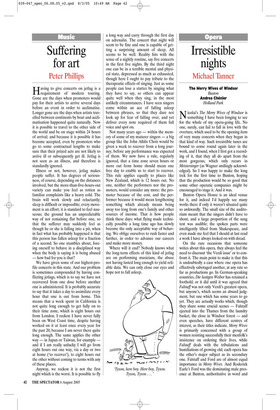Suffering for art
Peter Phillips
Having to give concerts on jetlag is a requirement of modern touring. Gone are the days when promoters would pay for their artists to arrive several days before an event in order to acclimatise. Longer gone are the days when artists travelled between continents by boat and acclimatisation happened quite naturally. Now it is possible to travel to the other side of the world and be on stage within 24 hours of arrival; and because it is possible it has become accepted, even by promoters who go to some contractual lengths to make sure that their prized acts are not likely to arrive ill or subsequently get ill. Jetlag is not seen as an illness, and therefore is standardly ignored.
Illness or not, however, jetlag makes people suffer. It has degrees of seriousness, of course, depending on the distances involved, but the more-than-five-hours-out variety can make you feel as rotten as familiar complaints like a heavy cold. The brain will work slowly and reluctantly; sleep is difficult or impossible; every movement is an effort; it is standard to feel nauseous; the ground has an unpredictable way of not remaining flat before one, so that the sufferer may suddenly feel as though he or she is falling into a pit, when in fact what has probably happened is that this person has fallen asleep for a fraction of a second. So one stumbles about, forcing oneself to behave in a disciplined way when the body is saying it is being abused — how bad for you is that?
We have given some of our highest-profile concerts in this state. And our problem is sometimes compounded by having conflicting jetlags, which is to say we have not recovered from one dose before another one is administered. It is probably accurate to say that it takes a day to assimilate every hour that one is out from home. This means that a week spent in California is not quite long enough to get fully on to their time zone, which is eight hours out from London. I reckon I have never fully been on West Coast time, despite having worked on it at least once every year for the past 20, because I am never there quite long enough. The same applies the other way — in Japan or Taiwan, for example and if I am really unlucky I will go from eight hours out one way, via a day or two at home (‘to recover’), to eight hours out the other without coming to terms with any of these places.
Anyway, we reckon it is not the first night which is the worst. It is possible to fly a long way and carry through the first day on adrenalin. The concert that night will seem to be fine and one is capable of getting a surprising amount of sleep. All seems to be well. Reality hits with the sense of a nightly routine, say five concerts in the first five nights. By the third night one can be in a terrible mental and physical state, depressed as much as exhausted, though here I ought to pay tribute to the therapeutic effects of singing. Just as some people can lose a stutter by singing what they have to say, so others can appear quite well when they sing, in the most unlikely circumstances. I have seen singers come within an ace of falling asleep between phrases, so that they dare not look up for fear of falling over, and yet deliver every note required of them full voice and spot on.
Not many years ago — within the memory of some of my maturer singers — a big group like the John Alldis Choir would be given a week to recover from a long journey, before any performance was expected of them. We now have a rule, regularly ignored, that a time zone seven hours or more out from home should mean one free day to enable us to start to recover. This rule applies equally to places like New Zealand, which is 12 hours out. No one, neither the performers nor the promoters, would consider any more: the promoter because of the cost, and the performer because it would mean lengthening something which already means being away too long from one’s family and other sources of income. That is how people think these days: what flying made technically possible a long time ago has slowly become the only acceptable way of behaving. We oblige ourselves to rush faster and further, in order to advance our careers and make more money.
Where will it end? Nobody knows what the long-term effects of this kind of jetlag are on performing musicians, the abuse not having lasted long enough to yield reliable data. We can only close our eyes and hope not to fall asleep.











































 Previous page
Previous page